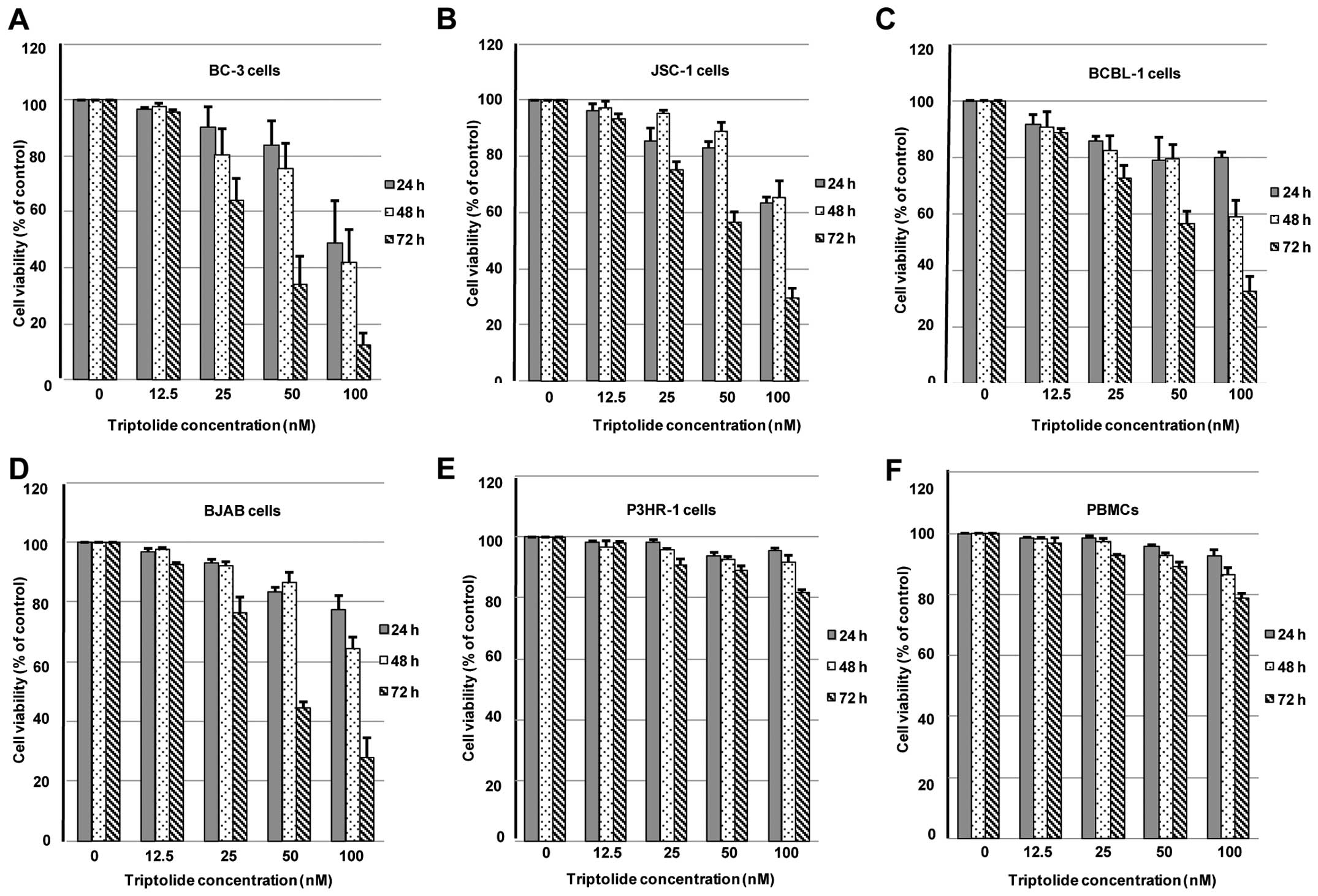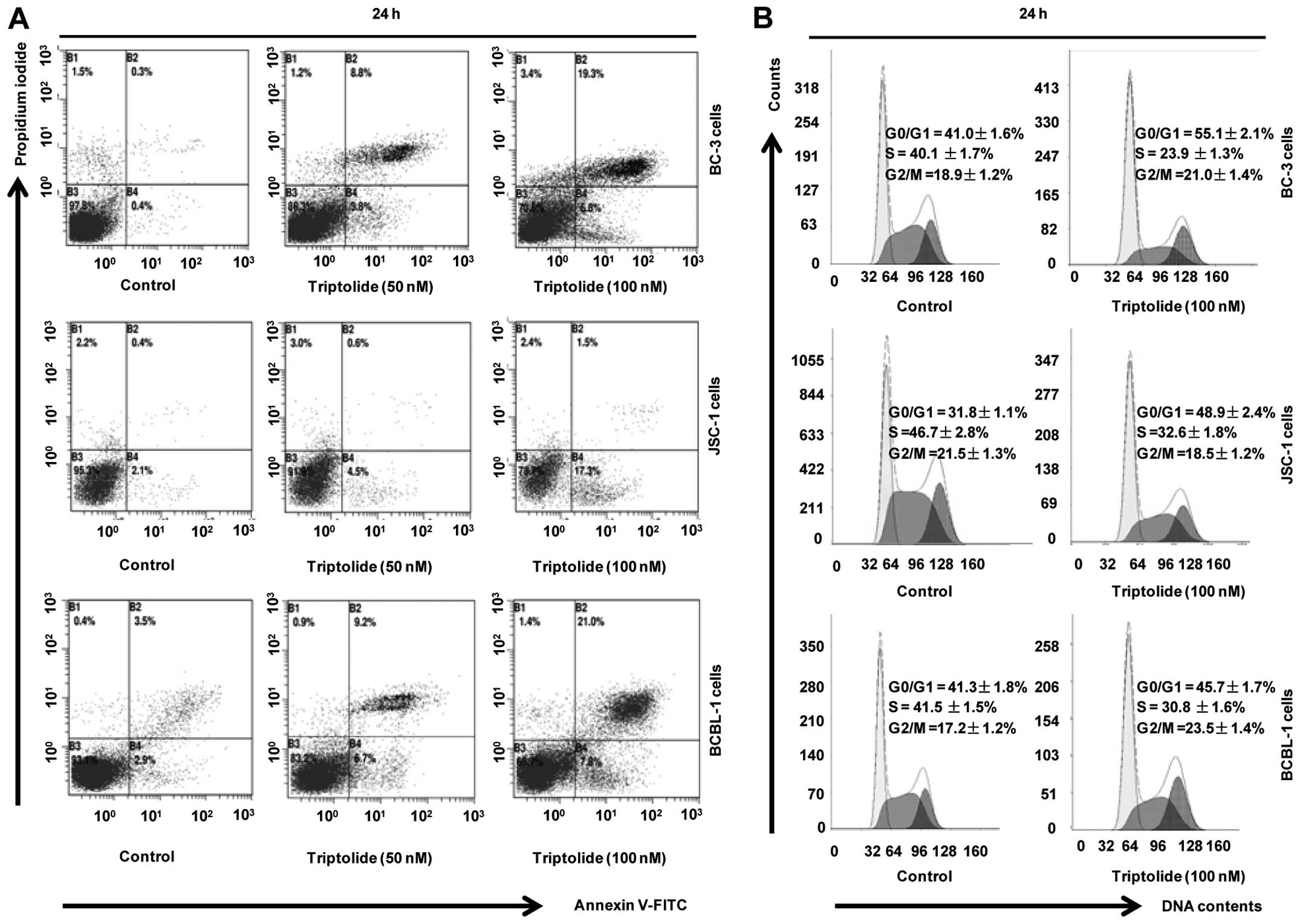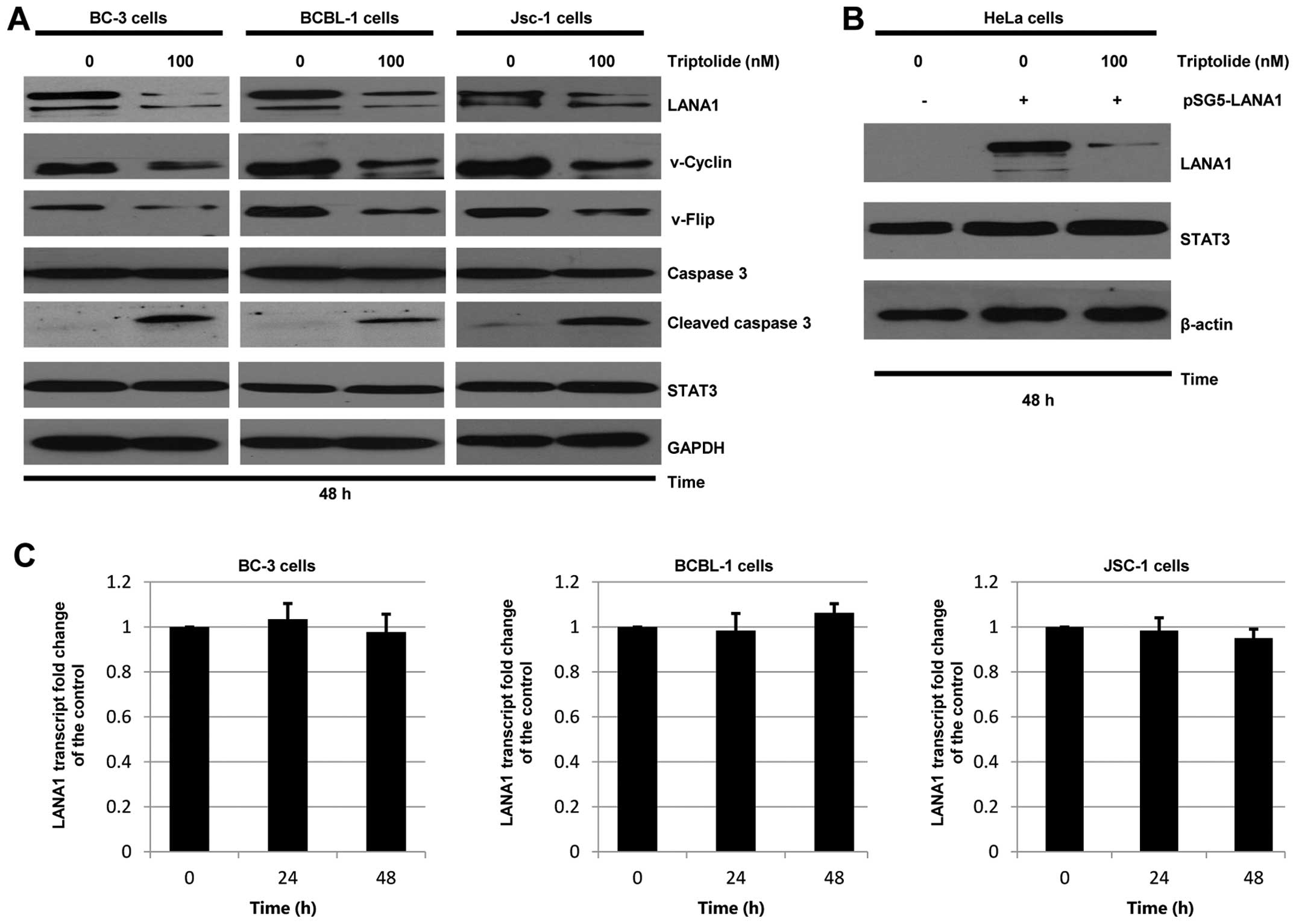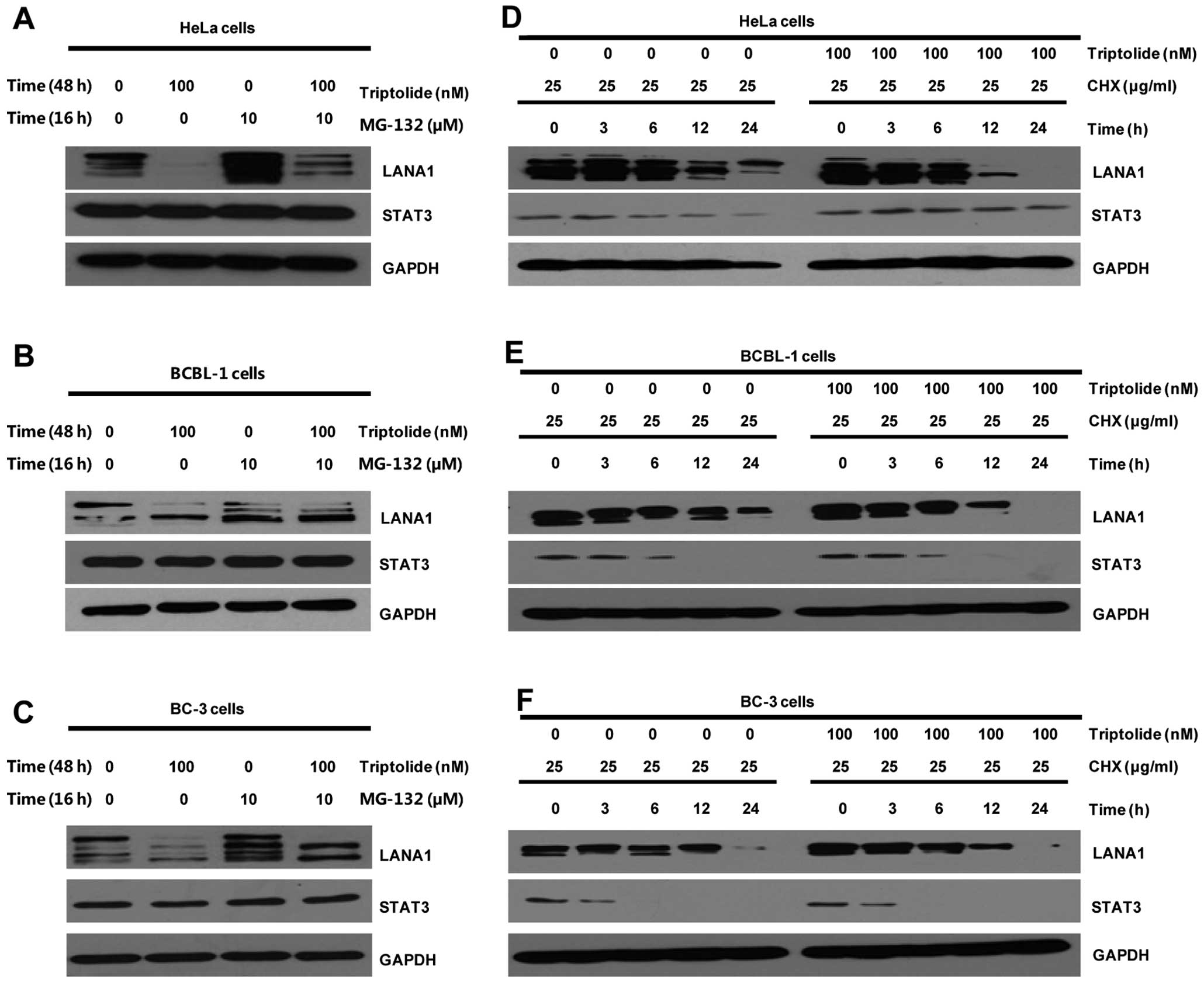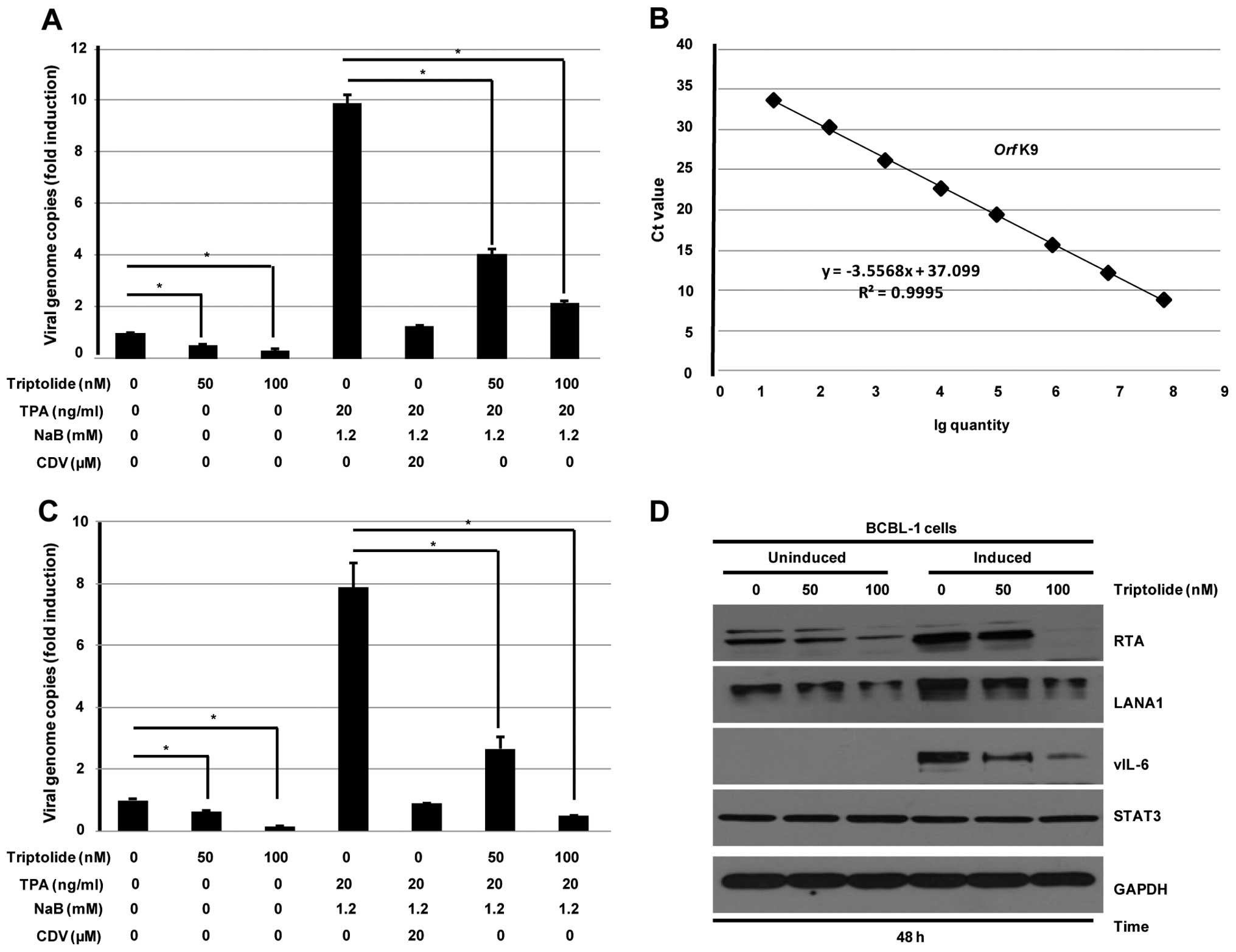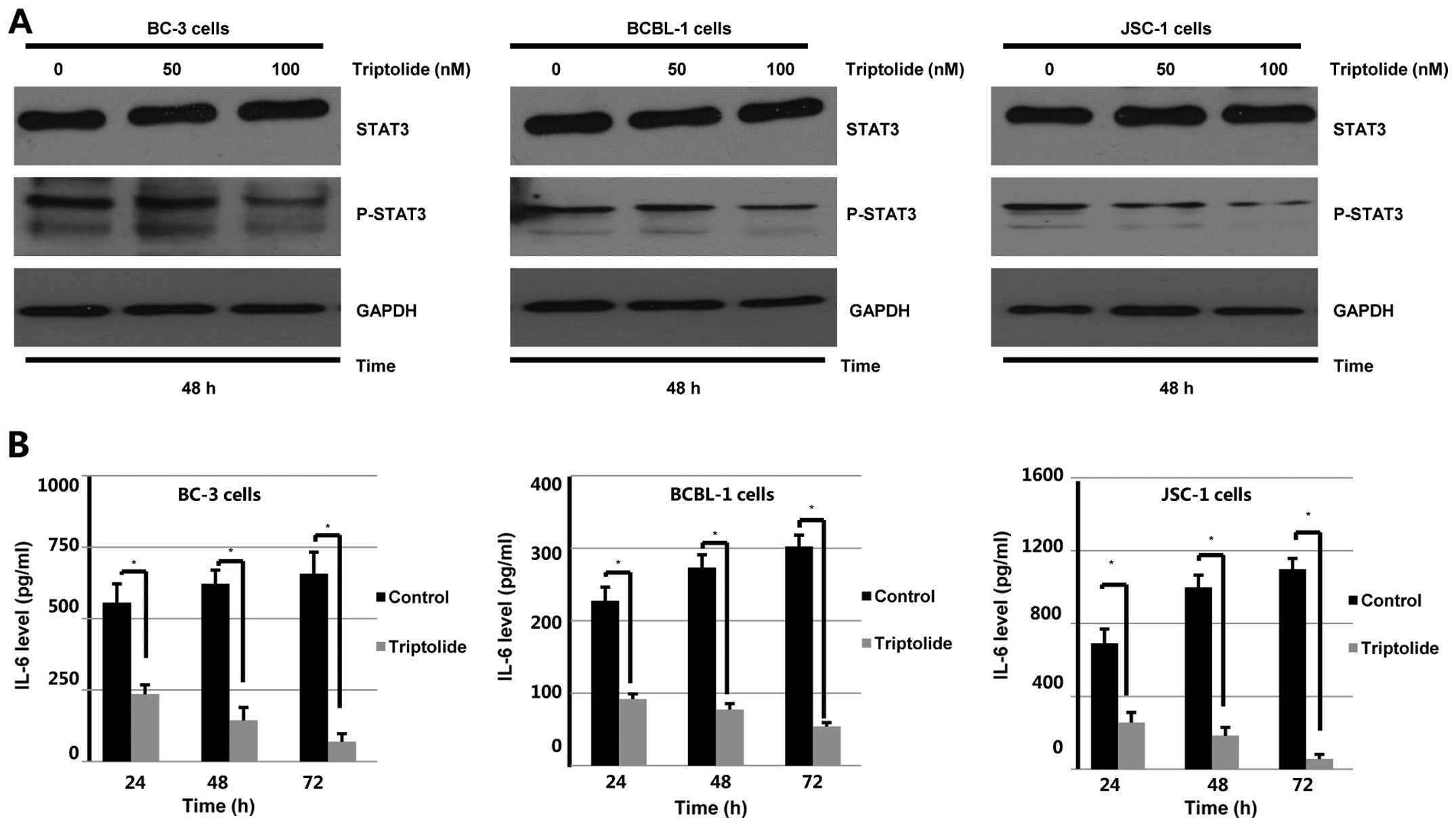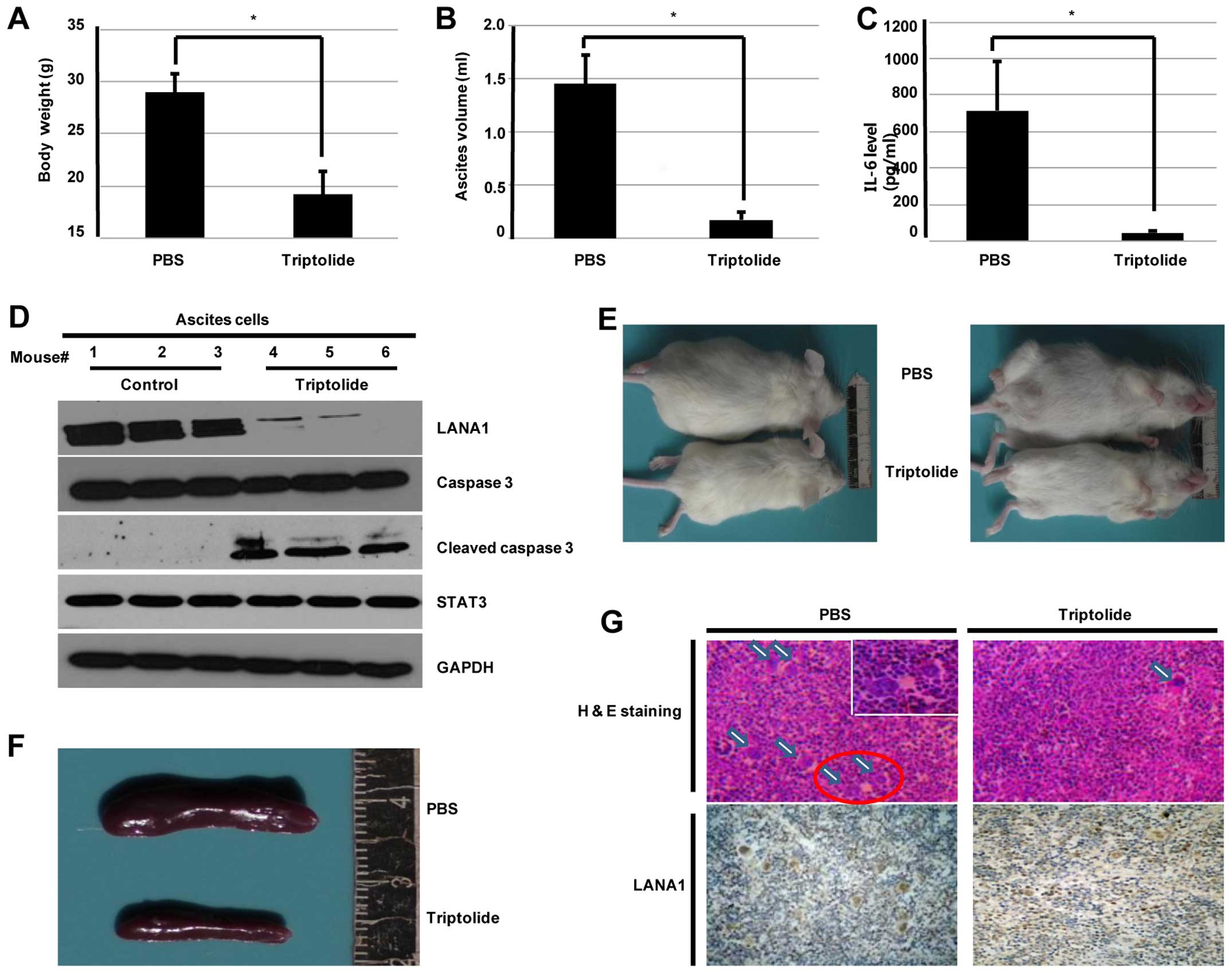|
1
|
Chang Y, Cesarman E, Pessin MS, Lee F,
Culpepper J, Knowles DM and Moore PS: Identification of
herpesvirus-like DNA sequences in AIDS-associated Kaposi's sarcoma.
Science. 266:1865–1869. 1994. View Article : Google Scholar : PubMed/NCBI
|
|
2
|
Boulanger E, Gérard L, Gabarre J, Molina
JM, Rapp C, Abino JF, Cadranel J, Chevret S and Oksenhendler E:
Prognostic factors and outcome of human herpesvirus 8-associated
primary effusion lymphoma in patients with AIDS. J Clin Oncol.
23:4372–4380. 2005. View Article : Google Scholar : PubMed/NCBI
|
|
3
|
Boshoff C and Chang Y: Kaposi's
sarcoma-associated herpes-virus: A new DNA tumor virus. Annu Rev
Med. 52:453–470. 2001. View Article : Google Scholar
|
|
4
|
Bottero V, Sadagopan S, Johnson KE, Dutta
S, Veettil MV and Chandran B: Kaposi's sarcoma-associated
herpesvirus-positive primary effusion lymphoma tumor formation in
NOD/SCID mice is inhibited by neomycin and neamine blocking
angiogenin's nuclear translocation. J Virol. 87:11806–11820. 2013.
View Article : Google Scholar : PubMed/NCBI
|
|
5
|
Sarosiek KA, Cavallin LE, Bhatt S, Toomey
NL, Natkunam Y, Blasini W, Gentles AJ, Ramos JC, Mesri EA and
Lossos IS: Efficacy of bortezomib in a direct xenograft model of
primary effusion lymphoma. Proc Natl Acad Sci USA. 107:13069–13074.
2010. View Article : Google Scholar : PubMed/NCBI
|
|
6
|
Coen N, Duraffour S, Snoeck R and Andrei
G: KSHV targeted therapy: An update on inhibitors of viral lytic
replication. Viruses. 6:4731–4759. 2014. View Article : Google Scholar : PubMed/NCBI
|
|
7
|
Dyson OF, Walker LR, Whitehouse A, Cook PP
and Akula SM: Resveratrol inhibits KSHV reactivation by lowering
the levels of cellular EGR-1. PLoS One. 7:e333642012. View Article : Google Scholar : PubMed/NCBI
|
|
8
|
Lee GM, Shahian T, Baharuddin A, Gable JE
and Craik CS: Enzyme inhibition by allosteric capture of an
inactive conformation. J Mol Biol. 411:999–1016. 2011. View Article : Google Scholar : PubMed/NCBI
|
|
9
|
Verma SC, Lan K and Robertson E: Structure
and function of latency-associated nuclear antigen. Curr Top
Microbiol Immunol. 312:101–136. 2007.
|
|
10
|
Sun Q, Tsurimoto T, Juillard F, Li L, Li
S, De León Vázquez E, Chen S and Kaye K: Kaposi's
sarcoma-associated herpesvirus LANA recruits the DNA polymerase
clamp loader to mediate efficient replication and virus
persistence. Proc Natl Acad Sci USA. 111:11816–11821. 2014.
View Article : Google Scholar : PubMed/NCBI
|
|
11
|
Uppal T, Banerjee S, Sun Z, Verma SC and
Robertson ES: KSHV LANA - the master regulator of KSHV latency.
Viruses. 6:4961–4998. 2014. View
Article : Google Scholar : PubMed/NCBI
|
|
12
|
Fujimuro M, Wu FY, ApRhys C, Kajumbula H,
Young DB, Hayward GS and Hayward SD: A novel viral mechanism for
dysregulation of beta-catenin in Kaposi's sarcoma-associated
herpesvirus latency. Nat Med. 9:300–306. 2003. View Article : Google Scholar : PubMed/NCBI
|
|
13
|
Lu J, Jha HC, Verma SC, Sun Z, Banerjee S,
Dzeng R and Robertson ES: Kaposi's sarcoma-associated
herpesvirus-encoded LANA contributes to viral latent replication by
activating phosphorylation of survivin. J Virol. 88:4204–4217.
2014. View Article : Google Scholar : PubMed/NCBI
|
|
14
|
Paudel N, Sadagopan S, Chakraborty S,
Sarek G, Ojala PM and Chandran B: Kaposi's sarcoma-associated
herpesvirus latency-associated nuclear antigen interacts with
multifunctional angiogenin to utilize its antiapoptotic functions.
J Virol. 86:5974–5991. 2012. View Article : Google Scholar : PubMed/NCBI
|
|
15
|
Verma SC, Borah S and Robertson ES:
Latency-associated nuclear antigen of Kaposi's sarcoma-associated
herpesvirus up-regulates transcription of human telomerase reverse
transcriptase promoter through interaction with transcription
factor Sp1. J Virol. 78:10348–10359. 2004. View Article : Google Scholar : PubMed/NCBI
|
|
16
|
Sun R, Liang D, Gao Y and Lan K: Kaposi's
sarcoma-associated herpesvirus-encoded LANA interacts with host
KAP1 to facilitate establishment of viral latency. J Virol.
88:7331–7344. 2014. View Article : Google Scholar : PubMed/NCBI
|
|
17
|
Sun Z, Xiao B, Jha HC, Lu J, Banerjee S
and Robertson ES: Kaposi's sarcoma-associated herpesvirus-encoded
LANA can induce chromosomal instability through targeted
degradation of the mitotic checkpoint kinase Bub1. J Virol.
88:7367–7378. 2014. View Article : Google Scholar : PubMed/NCBI
|
|
18
|
Friborg J Jr, Kong W, Hottiger MO and
Nabel GJ: p53 inhibition by the LANA protein of KSHV protects
against cell death. Nature. 402:889–894. 1999.
|
|
19
|
Radkov SA, Kellam P and Boshoff C: The
latent nuclear antigen of Kaposi sarcoma-associated herpesvirus
targets the retino-blastoma-E2F pathway and with the oncogene Hras
transforms primary rat cells. Nat Med. 6:1121–1127. 2000.
View Article : Google Scholar : PubMed/NCBI
|
|
20
|
Muromoto R, Okabe K, Fujimuro M, Sugiyama
K, Yokosawa H, Seya T and Matsuda T: Physical and functional
interactions between STAT3 and Kaposi's sarcoma-associated
herpesvirus-encoded LANA. FEBS Lett. 580:93–98. 2006. View Article : Google Scholar
|
|
21
|
Kupchan SM, Court WA, Dailey RG Jr,
Gilmore CJ and Bryan RF: Triptolide and tripdiolide, novel
antileukemic diterpenoid triepoxides from Tripterygium wilfordii. J
Am Chem Soc. 94:7194–7195. 1972. View Article : Google Scholar : PubMed/NCBI
|
|
22
|
Liu Q: Triptolide and its expanding
multiple pharmacological functions. Int Immunopharmacol.
11:377–383. 2011. View Article : Google Scholar : PubMed/NCBI
|
|
23
|
Zhou ZL, Yang YX, Ding J, Li YC and Miao
ZH: Triptolide: Structural modifications, structure-activity
relationships, bioactivities, clinical development and mechanisms.
Nat Prod Rep. 29:457–475. 2012. View Article : Google Scholar : PubMed/NCBI
|
|
24
|
Banerjee S, Sangwan V, McGinn O, Chugh R,
Dudeja V, Vickers SM and Saluja AK: Triptolide-induced cell death
in pancreatic cancer is mediated by O-GlcNAc modification of
transcription factor Sp1. J Biol Chem. 288:33927–33938. 2013.
View Article : Google Scholar : PubMed/NCBI
|
|
25
|
Phillips PA, Dudeja V, McCarroll JA,
Borja-Cacho D, Dawra RK, Grizzle WE, Vickers SM and Saluja AK:
Triptolide induces pancreatic cancer cell death via inhibition of
heat shock protein 70. Cancer Res. 67:9407–9416. 2007. View Article : Google Scholar : PubMed/NCBI
|
|
26
|
Chugh R, Sangwan V, Patil SP, Dudeja V,
Dawra RK, Banerjee S, Schumacher RJ, Blazar BR, Georg GI, Vickers
SM, et al: A preclinical evaluation of Minnelide as a therapeutic
agent against pancreatic cancer. Sci Transl Med. 4:156ra1392012.
View Article : Google Scholar : PubMed/NCBI
|
|
27
|
Sun X, Barlow EA, Ma S, Hagemeier SR,
Duellman SJ, Burgess RR, Tellam J, Khanna R and Kenney SC: Hsp90
inhibitors block outgrowth of EBV-infected malignant cells in vitro
and in vivo through an EBNA1-dependent mechanism. Proc Natl Acad
Sci USA. 107:3146–3151. 2010. View Article : Google Scholar : PubMed/NCBI
|
|
28
|
Sun X, Bristol JA, Iwahori S, Hagemeier
SR, Meng Q, Barlow EA, Fingeroth JD, Tarakanova VL, Kalejta RF and
Kenney SC: Hsp90 inhibitor 17-DMAG decreases expression of
conserved herpesvirus protein kinases and reduces virus production
in Epstein-Barr virus-infected cells. J Virol. 87:10126–10138.
2013. View Article : Google Scholar : PubMed/NCBI
|
|
29
|
Zhou H, Guo W, Long C, Wang H, Wang J and
Sun X: Triptolide inhibits proliferation of Epstein-Barr
virus-positive B lymphocytes by down-regulating expression of a
viral protein LMP1. Biochem Biophys Res Commun. 456:815–820. 2015.
View Article : Google Scholar
|
|
30
|
Chen W, Sin SH, Wen KW, Damania B and
Dittmer DP: Hsp90 inhibitors are efficacious against Kaposi Sarcoma
by enhancing the degradation of the essential viral gene LANA, of
the viral co-receptor EphA2 as well as other client proteins. PLoS
Pathog. 8:e10030482012. View Article : Google Scholar : PubMed/NCBI
|
|
31
|
Lin X, Liang D, He Z, Deng Q, Robertson ES
and Lan K: miR-K12-7-5p encoded by Kaposi's sarcoma-associated
herpesvirus stabilizes the latent state by targeting viral
ORF50/RTA. PLoS One. 6:e162242011. View Article : Google Scholar : PubMed/NCBI
|
|
32
|
Choi ES, Nam JS, Jung JY, Cho NP and Cho
SD: Modulation of specificity protein 1 by mithramycin A as a novel
therapeutic strategy for cervical cancer. Sci Rep. 4:71622014.
View Article : Google Scholar : PubMed/NCBI
|
|
33
|
Pica F, Serafino A, Garaci E and Volpi A:
Cidofovir on HHV-8 in BCBL-1 cells. Antivir Ther. 9:823–825.
2004.PubMed/NCBI
|
|
34
|
Aoki Y, Feldman GM and Tosato G:
Inhibition of STAT3 signaling induces apoptosis and decreases
survivin expression in primary effusion lymphoma. Blood.
101:1535–1542. 2003. View Article : Google Scholar
|
|
35
|
An J, Lichtenstein AK, Brent G and Rettig
MB: The Kaposi sarcoma-associated herpesvirus (KSHV) induces
cellular interleukin 6 expression: Role of the KSHV
latency-associated nuclear antigen and the AP1 response element.
Blood. 99:649–654. 2002. View Article : Google Scholar : PubMed/NCBI
|
|
36
|
Vázquez EL, Carey VJ and Kaye KM:
Identification of Kaposi's sarcoma-associated herpesvirus LANA
regions important for episome segregation, replication, and
persistence. J Virol. 87:12270–12283. 2013. View Article : Google Scholar
|
|
37
|
Järviluoma A, Koopal S, Räsänen S, Mäkelä
TP and Ojala PM: KSHV viral cyclin binds to p27KIP1 in primary
effusion lymphomas. Blood. 104:3349–3354. 2004. View Article : Google Scholar : PubMed/NCBI
|
|
38
|
Gopalakrishnan R, Matta H and Chaudhary
PM: A purine scaffold HSP90 inhibitor BIIB021 has selective
activity against KSHV-associated primary effusion lymphoma and
blocks vFLIP K13-induced NF-κB. Clin Cancer Res. 19:5016–5026.
2013. View Article : Google Scholar : PubMed/NCBI
|
|
39
|
Nicholas J: Human herpesvirus 8-encoded
proteins with potential roles in virus-associated neoplasia. Front
Biosci. 12:265–281. 2007. View
Article : Google Scholar
|
|
40
|
Quinlivan EB, Zhang C, Stewart PW,
Komoltri C, Davis MG and Wehbie RS: Elevated virus loads of
Kaposi's sarcoma-associated human herpesvirus 8 predict Kaposi's
sarcoma disease progression, but elevated levels of human
immunodeficiency virus type 1 do not. J Infect Dis. 185:1736–1744.
2002. View
Article : Google Scholar : PubMed/NCBI
|
|
41
|
Higashi C, Saji C, Yamada K, Kagawa H,
Ohga R, Taira T and Fujimuro M: The effects of heat shock protein
90 inhibitors on apoptosis and viral replication in primary
effusion lymphoma cells. Biol Pharm Bull. 35:725–730. 2012.
View Article : Google Scholar : PubMed/NCBI
|
|
42
|
Granato M, Chiozzi B, Filardi MR, Lotti
LV, Di Renzo L, Faggioni A and Cirone M: Tyrosine kinase inhibitor
tyrphostin AG490 triggers both apoptosis and autophagy by reducing
HSF1 and Mcl-1 in PEL cells. Cancer Lett. 366:191–197. 2015.
View Article : Google Scholar : PubMed/NCBI
|
|
43
|
Nador RG, Cesarman E, Chadburn A, Dawson
DB, Ansari MQ, Sald J and Knowles DM: Primary effusion lymphoma: A
distinct clinicopathologic entity associated with the Kaposi's
sarcoma-associated herpes virus. Blood. 88:645–656. 1996.PubMed/NCBI
|
|
44
|
Goto H, Kariya R, Shimamoto M, Kudo E,
Taura M, Katano H and Okada S: Antitumor effect of berberine
against primary effusion lymphoma via inhibition of NF-κB pathway.
Cancer Sci. 103:775–781. 2012. View Article : Google Scholar : PubMed/NCBI
|















